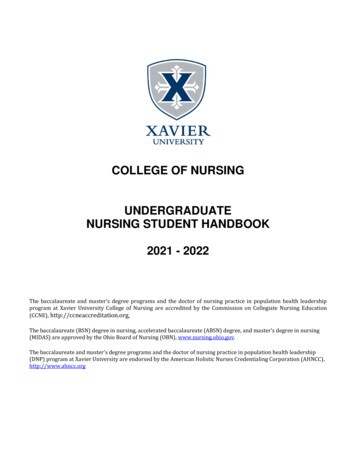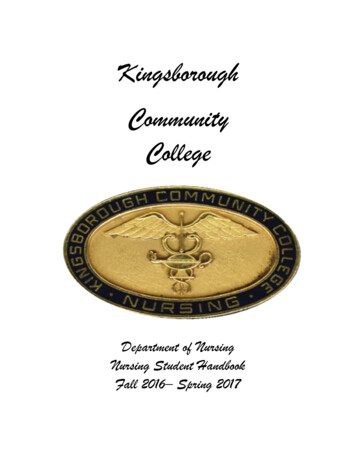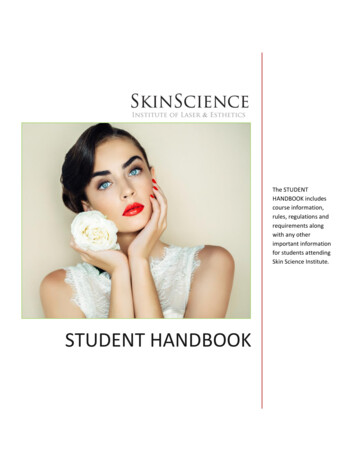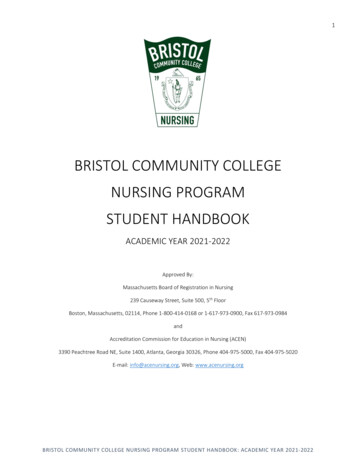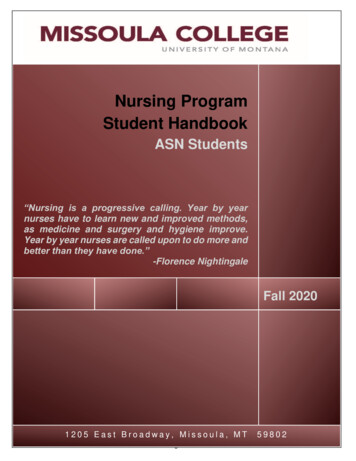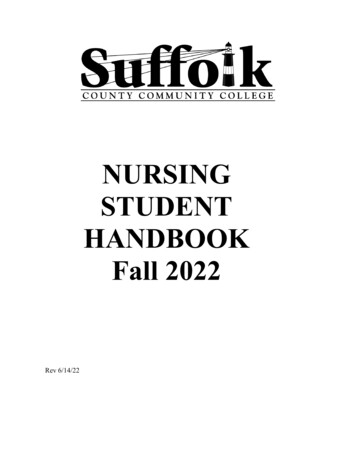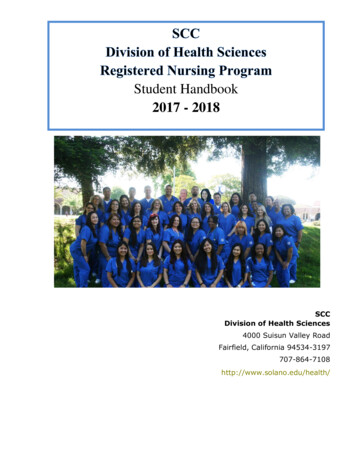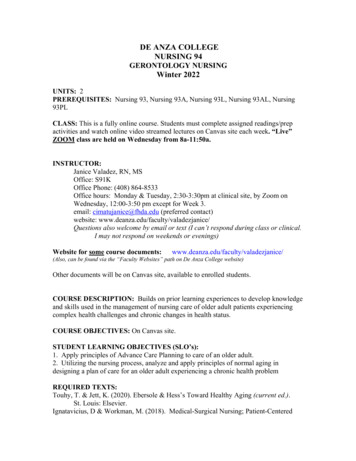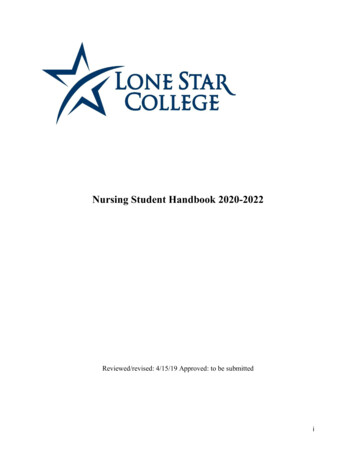
Transcription
Nursing Student Handbook 2020-2022Reviewed/revised: 4/15/19 Approved: to be submittedi
This student handbook contains both general guidelines, procedures and policies information specifically tailored forLone Star College (LSC) nursing students seeking admission to, admitted to and/or enrolled in the specific programsoffered at the Lone Star College. The LSC Nursing Student handbook also contains supplements in the Appendices,specific guidelines and procedures for the particular LSC College and nursing program that you are attending. Thesesupplements are to be used in conjunction with the LSC Nursing Student Handbook, the LSC Catalog and thesyllabus for each course. Every effort is made to keep the information current; however, policy and proceduralchanges may be made at any time. It is the responsibility of the student to keep current through theory and clinicalinstructors and online sources.Americans with Disabilities (ADA) StatementIt is the policy of LSC Colleges to comply with requirements of the Americans with Disabilities Act (ADA) asamended to provide reasonable accommodations unless such action shall pose an undue burden or would result in afundamental alteration of programs of the system. Individuals requesting ADA assistance under the letter or spirit ofADA should contact the ADA Coordinator at the LSC campus where they are enrolled in the nursing program.Academic AccountabilityAlthough participation and sharing of experience is an integral part of the Nursing Program, responsibility forlearning rests with the individual student. All assignments are to be considered as individual assignments unlessotherwise designated by the instructor. At these times, academic integrity guidelines hold the individual studentaccountable for working independently without assistance from other students. The individual student will notsolicit, accept, or give help on exams. At all times the student will honor his/her responsibility not to take credit forwork that is not his/her own. See Statement of Academic Integrity in LSC Catalog/Online, and the LSC NursingStudent Handbook.Equal Opportunity StatementLSC is committed to the principle of equal opportunity in education and employment. LSC does not discriminateagainst individuals on the basis of race, color, gender, religion, disability, age, veteran status, nationality, sexualorientation, or ethnicity in the administration of its educational policies, admissions policies, employment policies,scholarship and loan programs, and other LSC-administered programs and activities.Inquiries concerning the LSC’s policies, compliance with applicable laws, statutes, and regulations (such as Title VI,Title IX, and Section 504), and complaints may be directed to the Office of Human Resources, 832.813.6646. TheVice Chancellor for Human Resources is designated as the LSC’s Equal Opportunity Officer and Title IXCoordinator. Inquiries about the laws and about compliance may also be directed to the Assistant Secretary for CivilRights, U.S. Department of Education.Information on Eligibility for Nursing LicensureStudents enrolled in an associate degree or a vocational nursing program preparing for licensure must be aware ofconditions that may disqualify them from licensure, and of their rights to petition the Texas Board of Nursing for aDeclaratory Order of Eligibility. Completion of the associate degree or vocational nursing program does notautomatically qualify the graduates for the respective licensure examination by the Texas Board of Nursing. Pleaserefer to eligibility requirements within this handbook for further information.
Table of ContentsGeneral InformationContentsTable of Contents . 3LONE STAR COLLEGE NURSING PROGRAMS . 5MISSION STATEMENT OF NURSING . 5PHILOSOPHY OF NURSING EDUCATION . 5RN to BSN PROGRAM . 7PROGRAM LEARNING OUTCOMES (PLO) . 7ASSOCIATE DEGREE NURSING PROGRAM LEARNING OUTCOMES (PLO) . 8VOCATIONAL NURSING PROGRAM LEARNING OUTCOMES (PLO) . 9STUDENT ACCOUNTABILITY FOR MEETING PROGRAM REQUIREMENTS . 10NURSING PROGRAM REQUIREMENTS . 10ELIGIBILITY FOR CLINICAL AND LICENSURE BY TEXAS BOARD OF NURSING . 11GRADUATION AND LICENSURE . 12PROOF OF HEALTH INSURANCE . 13PROFESSIONAL LIABILITY INSURANCE . 13STUDENT HEALTH PROCEDURES . 13PREVENTION OF EXPOSURE TO BLOOD OR BODY FLUIDS . 17STATEMENT OF ACADEMIC INTEGRITY . 17CONFIDENTIALITY STATEMENT. 17CHILDREN/VISITORS IN THE CLASSROOM. 18NURSING PROGRAM . 18CLINICAL SECTION ASSIGNMENTS . 18NURSING CODE OF CONDUCT . 18Examples can include: . 21REFUSAL TO PROVIDE CARE . 22STUDENT CLASS REPRESENTATIVES . 22PROGRESSION REQUIREMENTS . 22GRADING AND EVALUATION . 22EXAMINATION REVIEW . 23MAKE-UP EXAMINATION GUIDELINES . 23CRITICAL INCIDENT/CONFERENCE . 23BACCALAUREATE DEGREE NURSING PROGRAM ATTENDANCE . 24ASSOCIATE DEGREE NURSING PROGRAM ATTENDANCE . 24VOCATIONAL NURSING PROGRAM ATTENDANCE . 25ACADEMIC INTEGRITY AND DISHONESTY, STUDENT ACADEMIC CODE OFCONDUCT, INFRACTIONS, SANCTIONS AND APPEALS . 26RE-ADMISSION GUIDELINES . 26RE-APPLICATION GUIDELINES . 27DEADLINES FOR RE-ADMISSION . 27STUDENT PROGRAM EVALUATION . 27STUDENTS WITH TEMPORARY DISABILITY . 30
ACADEMIC SUPPORT AND STUDENT SERVICES . 30STUDENT GUIDELINES FOR CLINICAL AREA . 31CLINICAL DRESS GUIDELINES . 31GUIDELINES FOR THE EMPLOYMENT OF NURSING STUDENTS . 32ADN PROGRAM MEDICATION ADMINISTRATION . 33AUTOMATED DISPENSING SYSTEMS. 34VOCATIONAL NURSING PROGRAM MEDICATION GUIDELINES . 35VOCATIONAL NURSING IV / VENIPUNCTURE GUIDELINES. 36APPENDIX A . 37TEXAS BON --VOCATIONAL NURSING EDUCATION . 38ESSENTIAL COMPETENCIES OF GRADUATES OF TEXAS VOCATIONAL NURSINGEDUCATIONAL PROGRAMS . 39TEXAS BON--ASSOCIATE DEGREE NURSING EDUCATION . 41ESSENTIAL COMPETENCIES OF GRADUATES OF TEXAS DIPLOMA ANDASSOCIATE DEGREE NURSING EDUCATION PROGRAMS . 42
LONE STAR COLLEGE NURSING PROGRAMSThe nursing faculty of Lone Star College (LSC) is committed to the stated vision, mission, andvalue statements of the institution and to the concept of quality education to meet communityneeds through the preparation of individuals to function at a variety of levels of nursing practice.MISSION STATEMENT OF NURSINGThe mission of the nursing programs of LSC is to provide a quality education to preparecompetent, caring, ethical nurses to function as members of the health care team in the dynamichealth care environment. We believe the community college provides an ideal, accessible settingfor nursing education where students of all educational and cultural backgrounds may achievetheir goals.The uniqueness of each individual college program, faculty, and students isacknowledged and respected. The individual campuses implement the philosophy to meet thediverse needs of the communities they serve.PHILOSOPHY OF NURSING EDUCATIONThe nursing faculty are committed to quality programs that provide distinctive levels ofpreparation with clearly differentiated essential competencies. The graduates of all levels areprepared to provide and coordinate health care of individuals and their families throughout thelifespan across the health continuum. The nursing program strives to build on each student’sprior experience. Nursing education synthesizes knowledge from the arts, biological, physical,behavioral and social sciences, incorporates critical reasoning, psychomotor and psychosocialskills, and empowers students to develop the knowledge and skills to become safe practitioners.Progressively complex learning tasks build upon previous knowledge and experience and furtherserve as a motivational force for continued, lifelong learning. Learning becomes more effectivewhen the learner is an active participant.Nursing education must be proactive in the ever-changing healthcare environment andprovide opportunities for students to prepare for evolving nursing roles. Educational experiencesare planned in diverse health care settings. Nursing faculty encourage students to strive forexcellence and quality by utilizing a variety of current educational theories, nursing theories, andevidence-based strategies.The nursing role is characterized by the utilization of a systematic, problem-solvingprocess, a caring relationship, and commitment to continuing education and professionalism inpractice.Nurses collaborate with the patient, family, significant others, and members of theinterdisciplinary health care team to empower the patient and/or family to make informeddecisions, prevent illness, and restore and maintain their optimal level of function. Each graduateof the associate degree or vocational nursing program assumes increasing levels of accountabilityand responsibility in practice, demonstrating competencies in the roles of provider of patientcentered care, patient safety advocate, member of the profession, and member of the healthcareteam pursuant to Texas Board of Nursing Differentiated Essential Competencies (DEC). Link toTBON website: http://www.bon.texas.gov/pdfs/differentiated essential competencies-2010.pdf
Other concepts incorporated throughout the nursing curriculum include the following as relatedto the value statements and basic intellectual competencies in the core curriculum.The Teaching/Learning Process for the Adult LearnerImportant concepts of teaching and learning are taught to assist students in their own learningand to develop effective teaching techniques for their patients.The Decision Making Process/Clinical JudgmentCritical reasoning is essential to the decision making process in nursing, incorporatinginformation from a specific knowledge base, experience, competencies, attitudes, and standardsin order to promote safe practices. Decisions are also based on knowledge from evidence-basedpractice and advancing technology.The Communication ProcessNursing requires effective use of communication skills to function in interviewing, teachinglearning, and counseling situations with patients and families as well as in collaborating with otherhealth care team members.The Process of Health PromotionThe promotion of health is an integral component of nursing practice. This includes diseaseprevention, health maintenance, rehabilitation, and restoration of optimal health and comfort.The Process of Developing a Patient-Centered, Caring RelationshipTo provide patient-centered care the nurse must first recognize a person’s worth, dignity, andframe of reference, within the diversity of experience, lifestyle, and culture. A therapeuticrelationship between nurses, patients, and their families begins with the nurse using reflection,self-analysis, and self-directed learning. The nurse-patient relationship progresses to the givingof self while providing competent nursing care to patients and their families. A caringrelationship develops as the nurse becomes empathetic and responds to the needs of theindividual, family, and group. Interaction with patients in a humanistic, empathetic manner is theart of caring in nursing. Additional core concepts in the integrated curriculum are used to providestructure and content outlines for each nursing course. These are also intertwined with the DEC. Role of the Nurse Biopsychosocial Oxygenation & Circulation Neuromuscular, Skeletal, and Sensation Maternal/Newborn and Reproduction Protection and Regulatory Mechanisms Nutrition, Digestion, Excretion and Elimination Revised and Approved:2/8/2017
RN to BSN PROGRAMPROGRAM LEARNING OUTCOMES (PLO)At the completion of the RN to BSN Nursing program at LSC, the graduate will be able to:1. Synthesize knowledge from the disciplines of nursing, sciences, and humanities to address the healthcare of individuals, families, groups, communities, and populations across the life span in diverse andglobal health care systems and environments.2. Communicate effectively and work collaboratively with interdisciplinary teams to provide care toindividuals, families, groups, communities, and populations to design, manage, and deliver highquality and safe patient-centered care.3. Acquire knowledge and apply management skills necessary to be effective and professional leadersthrough the delivery of socially, ethically, and financially responsible care while embracing theconcept of life-long learning.4. Engage in a systematic process incorporating clinical reasoning and evidence-based practiceoutcomes as the basis for decision-making and the delivery of safe comprehensive patient care.5. Utilize current research and the scientific process to collect and analyze physical, genetic,psychological, spiritual, socio-economic and environmental data related to patients and communities.6. Use technology and information systems to communicate, manage information, and support decisionmaking to improve patient outcomes within the healthcare delivery system.
ASSOCIATE DEGREE NURSING PROGRAM LEARNING OUTCOMES (PLO)At the completion of the Associate Degree Nursing program at LSC, the graduate will be able to:Member of the Profession1. Demonstrate accountability and responsibility for the delivery of care within the ethicaland legal scope of practice, professional standards and best practice.2. Manage information using technology to support decision making to improve patientcare.3. Demonstrate responsibility for continued competence in nursing practice and developinsight through reflection, self-analysis, and self-directed learning.Provider of Patient Centered Care4. Provide safe, compassionate, comprehensive, individualized patient-centered nursingcare, based on the nursing process and evidence-based practice, to culturally diversepatients and families across the life span and wellness-illness continuum.5. Develop, implement, and evaluate teaching plans to address health promotion,maintenance, and restoration.Patient Safety Advocate6. Advocate for the provision of safe quality health care for patients and their families.Member of the Health Care Team7. Coordinate human information and material resources in providing care for patients andtheir families.Approved by LSC Curriculum Committee: 2/8/2017
VOCATIONAL NURSING PROGRAM LEARNING OUTCOMES (PLO)At the completion of the Vocational Nursing program at LSC, the graduate will be able to:Member of the Profession1. Function within the nurse’s legal scope of practice and in accordance with the policiesand procedures of the employing health care institution or practice.2. Apply a working knowledge of patient’s rights, protecting the rights and dignity of thepatient and respecting the rights of others to have their own value system.Provider of Patient Centered Care3. Utilize the nursing process, evidenced-based practice, and a commitment to caring forculturally diverse patients across the life span and wellness-illness continuum.4. Use clinical reasoning and a problem-solving approach as the basis for decision makingin practice, based on application of scientific principles and clinical data.5. Provide patient centered nursing care for patients in structured health care settings whoare experiencing common, well-defined health problems with predictable outcomes.6. Demonstrate responsibility and accountability for the quality of the care provided topatients and their families.7. Utilize effective communication and collaborate with patients, families, andinterdisciplinary health care team members.Patient Safety Advocate8. Adhere to the Texas Nursing Practice Act and Texas State Board of Nursing Rules thatemphasize safety.9. Accept and make assignments that take into consideration patient safety andorganizational policy.Member of the Health Care Team10. Collaborate in the development and implementation of teaching plans for the patient andtheir families with common health problems and well-defined health learning needs.11. Assist in the coordination of human, information, and material resources in providingpatient centered care.Reviewed and Approved: 2/8/2017
STUDENT ACCOUNTABILITY FOR MEETING PROGRAM REQUIREMENTSIt is the responsibility of the student to be certain that prerequisite and co-requisitecourses are completed as prescribed in the degree plan/certificate plan. Advisors, nursing facultyand the program director are available throughout the semester and during every registrationperiod to advise students on required course work. It is the responsibility of the student to reviewthe individual degree plan/advising profile with an advisor each semester.Failure to review the degree plan/advising profile on a regular basis could jeopardizeprogression to the next nursing course or delay the granting of the Baccalaureate degree, AASdegree or VN certificate. The student cannot sit for the state licensing exam until all requiredcourses and program requirements for the degree/certificate are completed and grades areofficially processed by the LSC.A three-hour elective in the area of Creative Arts/Language, Philosophy & Culture isrequired to complete the associate degree plan. The student should validate the choice of anelective with an advisor before enrolling in the course. *Refer to the current college catalog forDegree Plan for the year admitted or readmitted to the program (also Refer to ProgressionRequirements in LSC Catalog).NURSING PROGRAM REQUIREMENTSDrug screening may be required at some clinical sites during the student’s enrollment at aLSC nursing program. The cost of all drug screens, physical examination, health insurance, labtiters and immunizations/boosters is the responsibility of the student. Any temporary change inhealthcare status must be reported to the Director and present medical clearance prior toreturning to class or clinical.Any change in criminal status of a student currently registered MUST BE REPORTEDTO THE PROGRAM DIRECTOR AND TEXAS BOARD OF NURSING IMMEDIATELY.Failure to do so is grounds for dismissal from the nursing program. The Board of Nursingnotifies the school of infractions needing to submit a Declaratory Order. Students with anyquestions in background must file a Declaratory Order with the Texas Board of Nursing. Theclinical affiliate institutions also have varying criteria for eligibility to engage in clinicalactivities at their institution. Student backgrounds or other issues could lead to a student beingdenied access to a clinical affiliate institution because of adverse behaviors revealed on acriminal background check, Board of Nursing wrap-back, or drug screen.
ELIGIBILITY FOR CLINICAL AND LICENSURE BY TEXAS BOARD OF NURSINGNursing applicants must answer the following questions to be eligible for clinical practice inconjunction with education programs and for eventual licensure in the state of Texas. There arethree distinct types of questions: criminal offense questions, chemical dependency questions, andmental illness questions. Affirmative answers require submission of a petition for a DeclaratoryOrder (D.O.) for Eligibility. The Texas BON review of an applicant’s D.O. can take three to sixmonths to complete.For any Criminal Offense 1, 2, including those pending appeal, have you ever:1. Been convicted of a misdemeanor?2. Been convicted of a felony?3. Pled nolo contendere, no contest, or guilty?4. Received deferred adjudication?5. Been placed on community supervision or court-ordered probation, whether or notadjudicated guilty?6. Been sentenced to serve jail or prison time? Court-ordered confinement?7. Been granted pre-trial diversion?8. Been arrested or have any pending criminal charges?9. Been cited or charged with any violation of the law?10. Been subject of a court-martial; Article 15 violation; or received any form of militaryjudgment/punishment/action?(You may only exclude Class C misdemeanor traffic violations.)Also for any Criminal Offense 1, 2:1. Are you currently the target or subject of a grand jury or governmental agency investigation?2. Has any licensing authority refused to issue you a license or ever revoked, annulled,cancelled, accepted surrender of, suspended, placed on probation, refused to renew a license,certificate, or multi-state privilege held by you now or previously, or ever fined, censured,reprimanded, or otherwise disciplined you?For any Chemical Dependency 3:1. Within the past five years have you been addicted to and/or treated for the use of alcohol orany other drug?For any Mental Illness 3:1. Within the past five years have you been diagnosed with, treated, or hospitalized forschizophrenia and/or psychotic disorder, bipolar disorder, paranoid personality disorder,antisocial personality disorder, or borderline personality disorder?Completion of associate degree or vocational nursing programs does not automaticallyqualify the graduates for licensure examination by Texas Board of Nursing. The Texas BON willevaluate each student for eligibility by making sure the student has successfully completed thenursing program and by checking the student’s criminal background and requiring responses toquestions regarding fitness related to chemical dependency and mental illness. The Texas Boardof Nursing requires all nursing students and alternates submit to these background checks.
Review the following websites to be informed of the Texas BON rules of eligibility forlicensure. Please contact the Director of Nursing Programs with any questions or need forclarification on eligibility issues.Detailed eligibility information is found in:1. Texas Occupations Code § 301.252, § 301.257, and §§ 301.452–469. (relating to licenseapplication, declaratory for license eligibility, and disciplinary action)2. Texas Administrative Code §§ 213.27–30 (relating to good professional character, licensureof persons with criminal conviction, criteria and procedures regarding intemperate use andlack of fitness in eligibility, disciplinary matters, and declaratory order of eligibility forlicensure)Use the links below to review the rules and regulations that govern eligibility forlicensure and your right to petition the Texas BON (Links current as of 09/2018).Texas BON Rules and Regulations: http://www.bon.texas.gov/licensure eligibility.aspTexas Board of Nursing website: TE: Expunged and Sealed Offenses: While expunged or sealed offenses, arrests, tickets, orcitations need not be disclosed, it is your responsibility to ensure the offense, arrest, ticket, orcitation has, in fact, been expunged or sealed. It is recommended that you submit a copy of theCourt Order expunging or sealing the record in question to our office with your application.Failure to reveal an offense, arrest, ticket, or citation that is not in fact expunged or sealed, willat a minimum, subject your license to a disciplinary fine. Non-disclosure of relevant offensesraises questions related to truthfulness and character.2NOTE: Orders of Non-Disclosure: Pursuant to Tex. Gov’t Code § 552.142(b), if you havecriminal matters that are the subject of an order of non-disclosure you are not required to revealthose criminal matters. However, a criminal matter that is the subject of an order of nondisclosure may become a character and fitness issue.Pursuant to other sections of the Gov’t Code chapter 411, the Texas Nursing Board is entitled toaccess criminal history record information that is the subject of an order of non-disclosure. If theBoard discovers a criminal matter that is the subject of an order of non-disclosure, even if youproperly did not reveal that matter, the Board may require you to provide information about anyconduct that raises issues of character. 3NOTE: *Pursuant to the Occupations Code § 301.207,information regarding a person’s diagnosis or treatment for a physical condition, mentalcondition, or chemical dependency is confidential to the same extent that information collectedas part of an investigation is confidential under the Occupations Code § 301.466.GRADUATION AND LICENSUREStudents who graduate but fail to register for and complete the NCLEX exam within twoyears of the graduation date will be required to complete an individualized remediation plan in asatisfactory manner, including, but not necessarily limited to:1. Auditing Nursing III and/or Nursing IV.2. Retaking the HESI exit exam and scoring a minimum of 850-900.
3. Completing assigned sections of an NCLEX review book as assigned by the NursingDirector.4. Lab skills check-off – to be determined by Nursing Director/Faculty.5. Pass the dosage calculation test administered in Nursing IV with a grade of 90 or betterwith a maximum of three attempts.6. Graduate is responsible for any cost incurred in meeting these requirements.Once the graduate/student has successfully completed the individualized remediation, theNursing Director will then sign the Affidavit of Graduation (AOG) to the Texas Board of Nursing.PROOF OF HEALTH INSURANCEClinical agencies may require proof of individual health insurance coverage. A groupplan is available through Student Services.PROFESSIONAL LIABILITY INSURANCEAll nursing students are required to carry professional liability insurance. Fees collectedat the time of registration cover the cost of the college student blanket policy with a majorinsurance carrier. This policy provides coverage ONLY at school-sanctioned clinical activities.STUDENT HEALTH PROCEDURESSource: Texas Dept. of State Health Services and LSC Risk ManagementLSC recognizes its responsibility to protect the rights and privileges of students,employees, patients, and the general public against the contact and spread of infectious diseases.LSC is also sensitive to the needs and rights of any of its employees or students who havecontracted diseases that might be infectious. In recognition of Human Immune Deficiency Virus(HIV), Tuberculosis (TB), Hepatitis B Virus (HBV), and Hepatitis C as serious public healththreats, LSC has adopted the following procedures.The faculty of the LSC Nursing Programs believe that with proper education, skills, andimmunizations, students in health careers can be reasonably protected from risks of infectionwhile performing clinical activities. The following procedures relate to the following:1. admission of students who have infectious diseases2. student immunization3. tuberculosis policies and procedures4. prevention of exposure to blood and body fluids5. exposure to blood or body fluids6. temporary disability/mobility assisted devices7. impaired students in clinical practice, and8. invasive campus
Lone Star College (LSC) nursing students seeking admission to, admitted to and/or enrolled in the specific programs offered at the Lone Star College. The LSC Nursing Student handbook also contains supplements in the Appendices, specific guidelines and procedures for the particular LSC College and nursing program that you are attending. These
